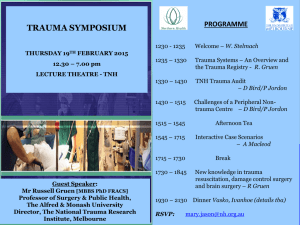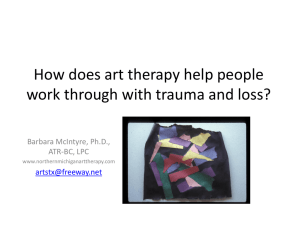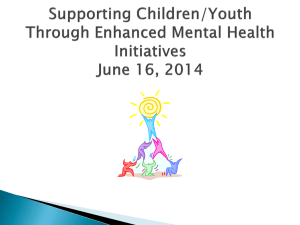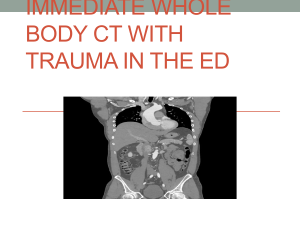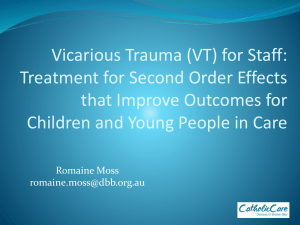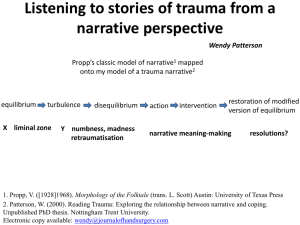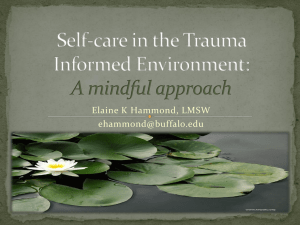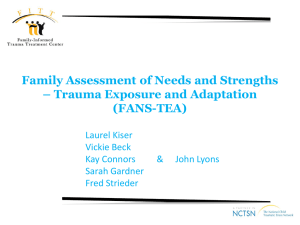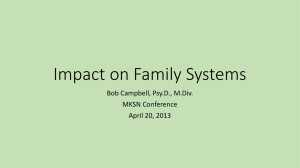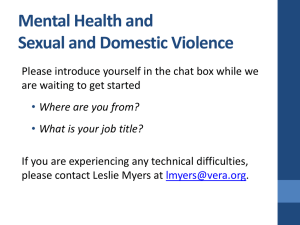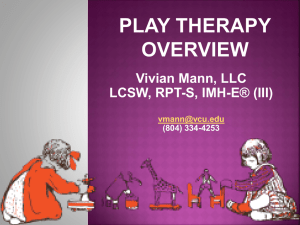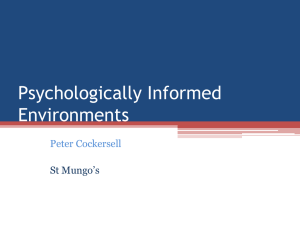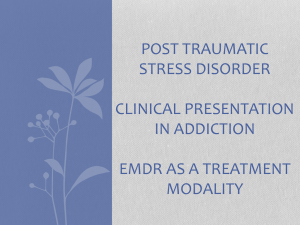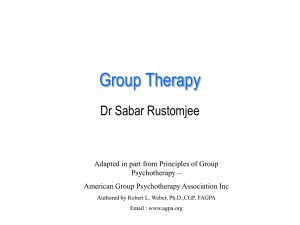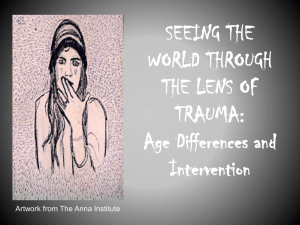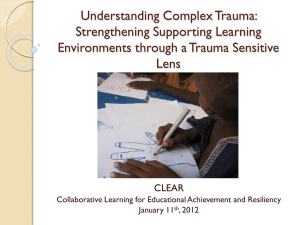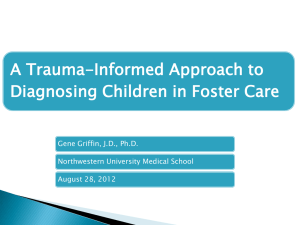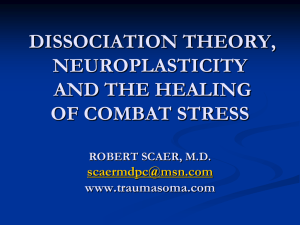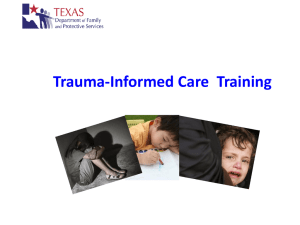Child-Parent Psychotherapy
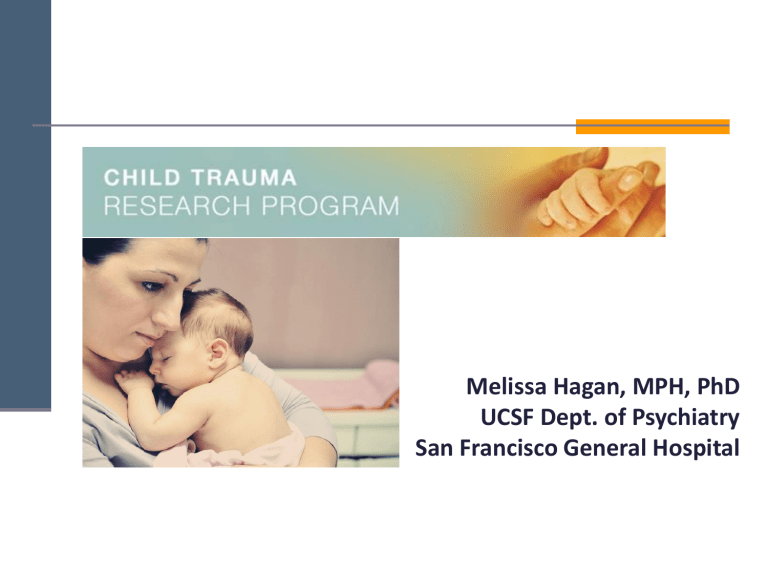
Melissa Hagan, PhD, MPH
UCSF Department of Psychiatry
UCSF Dept. of Psychiatry
San Francisco General Hospital
Child-Parent Psychotherapy
A Continuum from Stress to Trauma
Normative
Stress
Emotionally
Costly Stress
Traumatic
Stress
Trauma and Toxic Stress in Early
Childhood
Traumatic experiences disproportionately occur among children under the age of six
Exposure to domestic violence
Physical, sexual and verbal abuse
Neglect
Accidental injury
Animal attacks
Danger to caregiver (which is equated by young children as danger to self)
Trauma and Toxic Stress in Early
Childhood
Disrupts typical developmental processes in infants, toddlers, and preschoolers:
• Prolonged temper tantrums
• Sleep disturbances
• Heightened
Aggression
• Social withdrawal
• Post-traumatic play
• Difficulty coping with frustration
• Bouts of intense fear
• Separation anxiety
• Uncontrolled crying
• Regression in developmental achievements
Trauma Also Transforms Stress
Everyday stresses are mistaken as threats
Over-reaction to routine frustrations
Under-reaction to signals of danger
A consistent, caring relationship with the parent promotes resilience
“There is no such thing as a baby
. . . A baby cannot exist alone, but is essentially part of a relationship”
- Winnicott (1964)
A caregiver is instrumental in:
• decreasing child symptomatology
• enhancing school performance
• promoting social skills with peers and adults
Child-Parent Psychotherapy is a relationship-based approach
Dyadic therapy for caregivers and children under the age of six:
Attachment system: The main organizer of responses to danger in early childhood
Parent stress and trauma may interfere with their ability to regulate child emotions
Mental health symptoms arise when children:
do not feel protected from external threat
do not get relief from internal signals of danger
Multi-Theoretical Approach to Treatment
Developmentally Informed
Attachment focus
Trauma-based
Psychoanalytic theory
Social Learning processes
Cognitive–Behavioral strategies
Culturally attuned
Targets of Intervention (examples)
Caregivers’ and children’s maladaptive representations of themselves and each other
Caregiver-child interactions and behaviors that might interfere with the child’s mental health
Caregiver’s history of trauma and how it might impact their ability to support their child
Affect regulation for both child and caregiver
Child-Parent Psychotherapy
Intervention Modalities
3.
4.
5.
6.
1.
2.
Promote development: Play, language, touch
Unstructured/reflective developmental guidance
Modeling protective behaviors
Interpretation: linking past and present
Emotional support
Concrete assistance, case management, crisis intervention
Child-Parent Psychotherapy:
Does it work?
Five randomized controlled trials have shown:
Significant reductions in children’s PTSD symptoms
Decreases in child behavior problems and negative views of the self
Positive effects on attachment
Improvements in child cognitive functioning
Decreases in caregiver symptoms of distress functioning 35,40,44
Child-Parent Psychotherapy:
Where and How
Offered at the main Child Trauma Research
Program office at San Francisco General Hospital
CTRP has also partnered with the Tipping Point
Foundation to offer services through various community agencies
Families already being served by the communitybased agency partners have access to a clinician who is trained in CPP
Child-Parent Psychotherapy:
Where and How
Family referred to intake coordinator who conducts an intake phone call
Master’s or doctoral level clinician meets with family for extensive, multi-visit assessment of caregiver, child, and relationship functioning
Dyadic therapy is conducted usually on a weekly basis for 60-90 minutes with both caregiver and
child simultaneously
Length of treatment varies
Does CPP Improve Biological
Functioning?
Newest research initiative is to test impact of CPP on biomarkers
Stress response system
Immune system
Cellular Aging
Recruiting biological mothers and young children
(ages 3-6) exposed to interpersonal trauma for assessment and treatment with CPP
Referring Families to the
Child Trauma Research Program
Contact the Intake Coordinator:
Maria Torres, LMFT
Phone: 415-206-5311
Additional Resources
National Child Traumatic Stress Network http://www.nctsn.org
Zero to Three: The Impact of Trauma http://www.zerotothree.org/maltreatment/ trauma/trauma.html
General Recommendations
Recognize the possible traumatic origins of children’s behavioral problems and to ask the parents about frightening or upsetting events that the child may have experienced
Adopt an attitude of hope and support toward parents who disclose violence and trauma; treating parents with empathy and respect will help them engage in difficult conversations.
Provide appropriate referrals to mental health professionals and other community sources of support.
